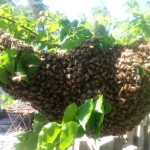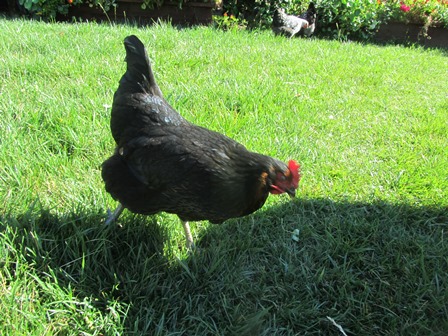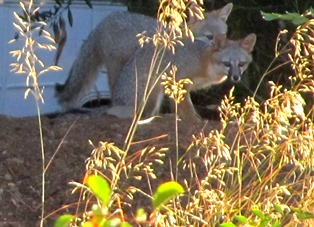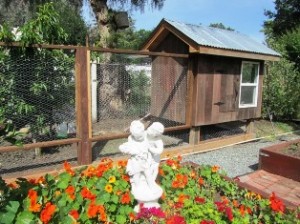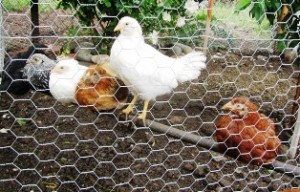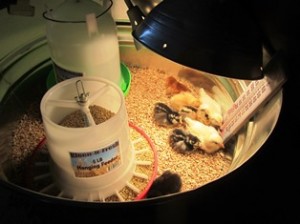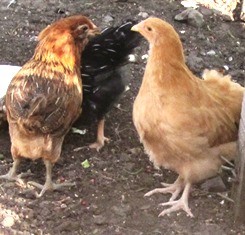Springtime Projects on the Farmette
After weeks of rain, Mother Nature has put on a robe of splendor. Warm weather has arrived. Already, my beekeeper neighbor has had his honeybee hives send out three swarms.
My own bee population seems to be swelling. I’ve fished out my swarm catcher, primed it with scented lemon oil, and placed in among the blossoms in a nearby apricot tree. I may be blessed with a swarm as well.
There are plenty of other springtime projects to attend to here on my farmette. I’ve got to reassemble my temporary grape arbor. Each year, I think we’ll build a permanent structure, but there never seems to be enough time.
My cell flats have organic plants up now and ready for placing in my garden or raised beds. I’d like to add some more chicken manure to the strawberries since they are rapidly growing and producing small fruit.
Other plants need a spring feeding–the citrus, apples, and apricots, for example. I usually do the feeding before the trees break bud, so I’m a little late.

This candy-stripe rose was a gift from a friend–a cutting from her rose that became a large bush in my care
I will be turning the compost pile and mulching all my rose bushes (which have already leafed out and are setting buds). Finally, I’d like to put up a couple more bird houses (mating is already in the air) and fill my hummingbird feeders.
- This–my original flock–was massacred by a wild predator, fox or coyote, last year
I need to purchase baby chicks from the feedstore to start my new flock. Hubby and I will build a new, reinforced chicken run and expand the existing hen house.
Then, there’s the side walkway that needs pavers. Painting of the fences. Building a new porch. Widening the patio…the projects are seemingly endless, but that’s fine. We’ll have a lovely six months (maybe an occasional storm). The dry season is upon us.
And I’m ready for the Adirondack chair…oh, that’s right…we have to build it first!
_________________________________________________________________
If you enjoy reading about farming topics and you love a good cozy mystery, check out my novels from Kensington Publishing–A BEELINE TO MURDER, THE MURDER OF A QUEEN BEE, and A HIVE OF HOMICIDES. All are available on Amazon.com, Barnes & Noble.com, and other online retailers as well as in bookstores everywhere.
A Sprained Leg Can Spell the End for a Chicken
Foxes have been routinely prowling my property and have claimed two chickens from my neighbor over the last few weeks. Thank goodness, they weren’t my hens. That said, one of my White Leghorns, a breed that originated in Tuscany but is widely raised here, developed a sprained leg, making her extra vulnerable to predators.
I noticed she was having trouble standing a few days ago. Then yesterday, I found her cowering under the hen house steps because the flock had been attacking her. I immediately removed her and tried to find a solution that would allow her time to heal without simultaneously having to find off foes.
My poultry run has its fencing wire buried into the ground and pieces wired together over the top. It’s built that way to prevent entry by raccoons, coyotes, and foxes that dig as well as hawks that hunt from the sky. But what to do with a flock of chickens that will peck to death another hen that get sick or injured?
Yesterday, inside the secure run, I built an inner circular area using poultry wire. Locating a large cardboard box, I filled it with nesting straw and stapled part of an old sheet as a curtain over the doorway. Then I put heavy blankets on the box for warmth (it’s been getting cold at night). I put a water dispenser and food outside her box and hoped for the best.
When I checked on the hen this morning, she was standing upright on both legs. She explored the inner run and then hopped back into the box to wait perhaps for the sun to warm the run. As quickly as she is healing, I might be able to integrate her back into the flock in a few days or a week.
The rains are coming tomorrow–another threat for the poor creature–so I’ll have to figure out another option to keep her dry and warm and safe. Still, she seems to be on the road to recovery and I hope returning to her scratching and foraging soon because she has stopped laying during this traumatic period. And she was one of my best egg layers; she’d lay an extra-large egg almost every other day. See, https://en.wikipedia.org/wiki/Leghorn_chicken
* * *
If you enjoy reading about farm topics (including gardening, beekeeping, and delicious recipes), check out my cozy mysteries A BEELINE TO MURDER and also THE MURDER OF A QUEEN BEE in the Henny Penny Farmette series (from Kensington Publishing).
These novels are available through online retailers such as Amazon, Barnes & Noble, Kobo Books, and Walmart as well as from traditional bookstores everywhere.
Find more info or to order, see, http://tinyurl.com/hxy3s8q
Now available in mass market paperback, this debut novel launched the Henny Penny Farmette series of mysteries and sold out its first press run.
See, http://tinyurl.com/h4kou4g
The Murder of a Queen Bee is the newest offering in the Henny Penny Farmette series. For more information, click on the link under the image.
Eggs Don’t Get Fresher Than This!
The chickens were making a ruckus this morning just after sunup. They often do that when one of them is occupying a favorite nesting box and another wants in. Finally, I got up and trudged out to the chicken house.
When I let the chickens out of their house into their run today, one of them–the Black Sex Link hen (Blacky)–hadn’t quite finished laying her egg.
But as they always do, the hens made a run for it when the door opened. Blacky included. They hopped out and followed the Rhode Island Red in the pursuit of grass and worms and other things chickens like to eat. That’s when I noticed Blacky waddling along, trailing the other hens. That’s unusual for her.
It soon became clear why. She had a fully formed brown egg halfway out. I’ve seen some strange things since raising these hens from when they were baby chicks housed in a big tub in my kitchen. But this was the strangest.
I reached down to see about giving the egg a bit of pull when Blacky decided to push. I caught the egg before it hit the ground.
* * *
If you enjoy reading about gardening, keeping bees, raising chickens, and creating delicious recipes, you might want to check out my novels from Kensington Publishing.
The Henny Penny Farmette series of cozy mysteries are available online and in tradition bookstores everywhere, in hardcover, kindle, and mass market paperback formats.
The MURDER OF A QUEEN BEE will be released in hardcover October 1.
Big, Blonde Buff-O Goes on the Attack
The yellow-colored Buff Orpington hen seemed so cute when she was all down and a day old.
But six months have passed, the Buff-O has feathered out and gone broody. Today, she showed me a nasty-tempered, cranky hen, with ruffled feathers who will stop at nothing to hatch the clutch of eggs she’s sitting on.
The problem is that some of those eggs in the nesting box aren’t hers, and they’re all unfertilized since we have no rooster.
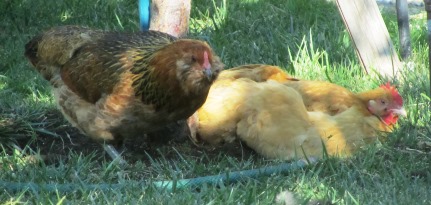
From left to right: Furry Face, the Ameracuana, and Buff-O, the Buff Orpington, when they used to sun themselves together
Buff-O has been sitting on the clutch of eggs for almost three weeks now, barely leaving to eat or drink. But today, she exited the hen house to take dirt bath–that’s how chickens clean themselves. Toss on the dirt, roll in it, then get up and shake like a dog, flinging the dirt in all directions as far as possible.
Before the fight started, all nine of my hens were foraging on our property, except for Buff-O and the shy Ameracauna with the furry face. The latter was in the chicken run, scratching the dirt, minding her own business.
I saw Buff-O walk over and lunge at Furry Face in attack mode. She used her beak to viciously peck Furry Face’s neck and her clawed toes to tear at the poor shy chicken’s back. She seemed more rooster than hen.
I ran for the hose and separated the two with a spray of water. Then, with both out of chicken run and into the yard, I gathered up all those unfertile, soon-to-be-rotten eggs that Buff-O has been trying in vain to hatch, and headed toward the garbage can.
But apparently, tossing those eggs changed nothing. Buff-O is back in the hen house on the nest–albeit, a different nesting box than before. But the straw in the original nesting box is still warm. It’s being occupied by Furry Face. Go figure!
Outfoxing the Foxes
The chickens made such a ruckus this morning, I thought they were having trouble with a rodent in the hen house. My architect husband built the sturdy hen house off the ground.
He installed windows for air circulation and to cool off the chicken house at night. Good idea, we thought. Maybe not.

One of three gray foxes that have been checking out the chicken house at dawn and in the late evening
The windows open (to let out the heat) through screens. But foxes and open windows present a clear and present danger for the chickens.
When I first spotted the foxes on the uninhabited acre of land behind our farmette, I put extra poultry wire over the chicken run and over the hen house windows.
Each night, I secure the iron gate between the properties. The foxes were close this morning. I couldn’t say whether or not they’d go over the fence, but I took some shots with my camera before they spooked and left.
To outfox the foxes, I added extra roofing to the chicken run and inspected the fence all around to make sure there were no holes or weakened areas where the foxes could dig under.
We’ve placed a call to the local wildlife shelter and are hopeful that a representative can help us understand why the foxes are in an urban area (maybe in search of water and food during this intense drought) and whether nor not they will rescue the lovely little gray fox family, which is our hope.
Dealing with a Flock of Stressed-Out, Feathered-Out Chicks
Now that the weather has turned warm here in Northern California, I have moved my baby chicks from the huge box in my kitchen to our newly constructed chicken house. I don’t know for certain, but I think they were feeling stressed out in the box and I was stressed from the noise and their behaviors of pecking each other and trying to fly out of the box.
The hen house has two windows that open and close for ventilation, nesting boxes, a front door for my access, a back exit door with stairs for the chickens to enter and leave, and a couple of perches inside and out. We wired a poultry screen over the top of the chicken run because of the predatory habits of local hawks.
Our chicks range in age from eight and ten weeks and are all feathered out. I feed them medicated crumble and provide fresh water daily. To ensure strong legs, I cover the chicken house floor with a bed of dried, crushed corn cob. I also have stuffed straw into the three nesting boxes so that when the chickens are ready to begin laying, they’ll have a bed ready.
The chicks are growing so fast, their girth and height seems to double every week. The bulk of their diet is crumble, but with an occasional treat such as shredded fresh lettuce and spinach leaves. Their activities and often-flighty behaviors are notable for chickens. They take dust baths, scratch the earth for grubs and worms, run at each other while seemingly intent on crashing only to avert at the last minute, perch together to roost, and peck their housemates. Oh, the pecking!
Guess which chicken is the most aggressive pecker from my flock that includes White Leghorn, Silver-Laced Wyandotte, Buff Orpington, Rhode Island Red, Black Sex Link, and an Ameraucana. Turns out,in my flock, the most aggression is shown by the Buff Orpington.
From day one, “Buffy” has pecked the quiet Ameraucana. Before the Ameraucana had feathered out, blood would flow from her back from Buffy’s senseless pecking. I tried to separate them, giving Buffy time outs and hoping to stop her behavior. It seemed to work . . . or, maybe I was just imagining it was.
I placed a dab of antibiotic cream on the back of the Ameraucana and within days, her pecking wound healed and now she’s feathered again over the wound. The move to the chicken house reduced the stress of living out of a box in the kitchen. Now the chickens seem to get along fine, even enjoying their life in the hen house.
Last night, Buff huddled up next to the Ameraucana on the roost and this morning I saw the two of them taking a dust bath together. Chicken stress relief. My stress relief. It’s a beautiful thing!
 Facebook
Facebook Goodreads
Goodreads LinkedIn
LinkedIn Meera Lester
Meera Lester Twitter
Twitter




